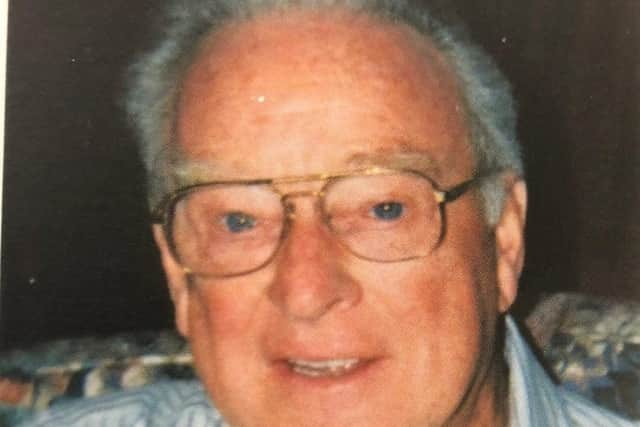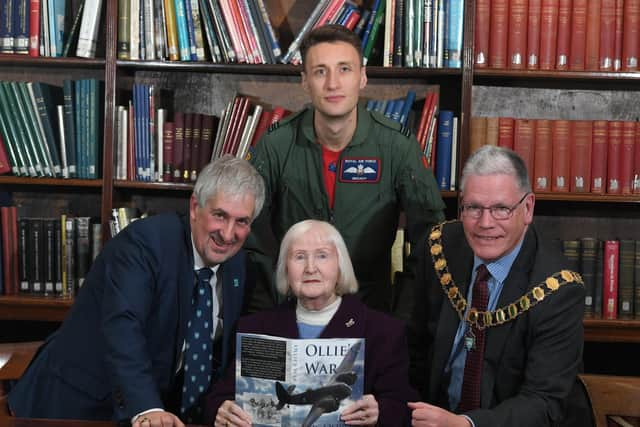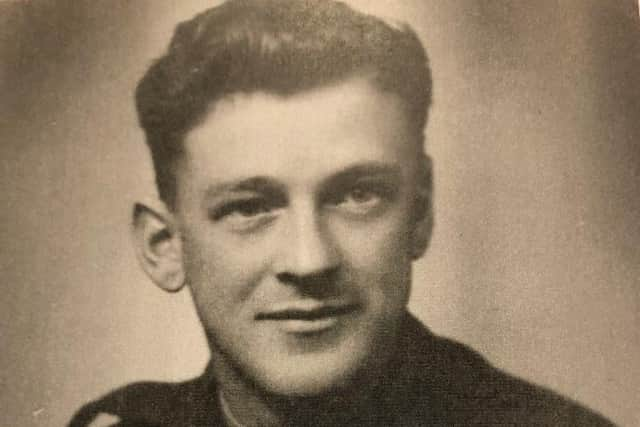Preston widow Joan turns husband Eric's harrowing wartime story into a book


Now widow Joan has turned his jottings into a hardback book to preserve his amazing story for posterity.
Ollie’s War is a symbol of Joan’s love for the husband who was haunted by his experiences during three-and-a-half years of captivity and only found solace when, on doctor’s advice, he wrote it all down.
Advertisement
Hide AdAdvertisement
Hide AdIt was only after Eric passed away in 2003 that Joan found his horde of school-style exercise books hidden away in a cupboard at their home in Lea, Preston.


“I sat down and read them and realised his story had to be told,” she said, proudly clutching a copy of the finished article.
“I wanted every member of our family to have a book so they would know what he had done and what he and the others had gone through. Hopefully they will pass them on to future generations and Eric’s story will live on.”
Joan has presented two copies of the book to the Harris Library in Preston - one for reference and one for lending - so a wider audience will be able to share a remarkable, yet harrowing account of one man’s war.
Advertisement
Hide AdAdvertisement
Hide AdLast year’s Preston Mayor, Trevor Hart, helped arrange a presentation of the book to the library.


“When I read it it was quite was quite an emotional experience,” said Trevor, who was Joan’s ward councillor until the May elections.
“It is very graphic about the conditions they had to endure. I almost felt I was there living it with him. It drags you in.”
Eric was a Warrant Officer in the Royal Air Force and was captured after his plane was forced to ditch in the Sunda Strait between Java and Sumatra after being shot up by Japanese fighters.
Advertisement
Hide AdAdvertisement
Hide AdFor the next three-and-a-half years, he suffered the horrors of life at the hands of the Japanese at camps in Borneo and Singapore, including the notorious Changi Jail.


Of the 1,250 men he was imprisoned with in Batu Lintang camp in Sarawak, only 556 were still alive when Australian troops liberated them in September 1945 – and dozens of those survivors died before they reached home.
Eric was on gravedigging detail, burying up to 10 comrades every day towards the end of his incarceration.
And it was only after the prisoners were freed that they discovered the Japanese had intended to execute them all within weeks. “We were saved by the bell, with just six weeks to spare,” he wrote.
Advertisement
Hide AdAdvertisement
Hide AdEric was one of the “lucky ones” to return from captivity. Most died of starvation, illness, or the unbridled brutality inflicted by their merciless guards. Of another 2,500 men shipped further north in Borneo to Sandakan camp, only six survived.
Back home in Lancashire in time for Christmas, he had nightmares and bouts of deep depression. He was suffering from what has since become known as post traumatic stress disorder (PTSD) and underwent electroconvulsive therapy at Whittingham Hospital in an attempt to alleviate his symptoms.
“He suffered quite badly,” said Joan. “Eric bottled it up - he kept a lot of it to himself.
“But it resurfaced again years later when I woke up one night and he wasn’t next to me in bed. I went downstairs and found him in the chair crying. He was heartbroken.
Advertisement
Hide AdAdvertisement
Hide Ad“Eric wasn’t one for crying, but I could see he was in a real state. He said to me: ‘I keep thinking about the lads who died.’ So the next day I got him an appointment at the doctor’s.
“The doctor listened to him and then said: ‘Well, why don’t you write it down? Just write a bit of it down at a time and get it off your mind. Get it on paper.’
“I got him one of those children’s exercise books from the shop and he started writing. He would sit down every night and just put a few memories and thoughts down. One exercise book became two and after a while he had filled a box.
“It was hard for Eric sometimes. But he was a very good writer and it was good therapy for him. It really did seem to help.”
Advertisement
Hide AdAdvertisement
Hide AdJoan had the hand-written exercise books typed up by a cousin. A family friend, author Steve Ragnall, advised her the story should be turned into a book and offered to edit it.
In the book’s introduction, Steve wrote: “It isn’t all doom and gloom. There is comedy and farce mixed in with the tragedy and trauma, though the tragedy, when it comes, is heart-rending.
“Eric’s personality comes through, his memories were accurate apart from the occasional date (which is of no real consequence) and my job of editing his story has been to correct a couple of place names, cut out a few repetitions and ensure that his voice remains intact.
“It has been an honour and a privilege to put this book together on Eric’s behalf.”
Advertisement
Hide AdAdvertisement
Hide AdEric, a Yorkshireman by birth, joined the RAF in March 1940 as an aircraftsman second class. He trained as a wireless operator and also as an aircrew gunner.
His first flights were in a Bristol Bombay troop carrier and he was part of the Overseas Delivery Pool (dubbed the Flying Bus Service) transporting planes to Egypt via Gibraltar and Malta to support the Allied forces in North Africa.
From there he switched to bombers with 84 Squadron in Iraq. And in the book he tells of a lucky escape he and his fellow crew members had in late 1941, just as they had arrived in the battle zone, when their plane’s undercarriage failed and they were forced to do a belly-flop landing in the desert
He moved on to the Far East as part of “Churchill’s Armada to Singapore.” But on February 24, 1942 disaster struck as his Blenheim bomber was on a mission from the Kalajari Airbase to attack Palembang Airport, the Japanese forces’ main base in Western Sumatra.
Advertisement
Hide AdAdvertisement
Hide AdEven before they got off the ground they had to dive for cover as Japanese bombers attacked, leaving their aircraft riddled with bullet holes. They swapped planes and took off with two others, but as they crossed the Sunda Strait three enemy fighters attacked.
Eric was firing at the attackers from his turret on top of the fuselage. One of his two machine guns jammed and, as he crouched down to try and free it, two bullets smashed through the turret where his head had been just moments earlier.
As the attack continued Eric’s plane suffered even more damage and started to lose oil. One engine was struggling and then the other started to misfire. Ditching in the sea was the only option.
They survived and were picked up from their liferaft by a yacht, which was itself detained by the Japanese Navy and so began Eric’s captivity.
Advertisement
Hide AdAdvertisement
Hide AdThe three-and-a-half years of suffering only ended after the United States dropped the atomic bomb on Hiroshima in August 1945 and followed it with another on Nagasaki days later. Japan surrendered, although it was almost a month later before all their troops, including those looking after prisoners of war, had laid down their arms.
Joan explained her reasons for wanting to get Eric’s memoirs into print, saying: “I started reading those hand-written exercise books and I felt it was a story that should be told.
“The books were very flimsy and I was thinking they could get torn or ruined. I wanted something a bit more permanent and something all the family could keep.
"Now, looking at it, I’m really proud of the finished article. It looks wonderful and I’m sure Eric would be pleased with it and delighted to see it in the Harris Library for everyone to read.”